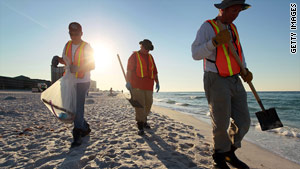Obama says laws must be updated after oil disaster

- Obama says Gulf oil disaster shows the inadequacy of current laws
- He specifically mentions the $75 million oil spill liability cap
- The president is also pushing his clean energy agenda
- He is scheduled to discuss clean energy with corporate leaders
Washington (CNN) -- President Barack Obama said Thursday that the ongoing oil disaster in the Gulf of Mexico has highlighted the inadequacy of current environmental pollution laws, and urged Congress to move forward with a series of changes in an "aggressive, forward-leaning way."
He made his remarks during a White House meeting with the bipartisan congressional leadership.
"At the top of our list was our continued response to the crisis in the Gulf," Obama said at the end of the meeting. "We had a frank conversation about the fact that the laws that have been in place have not been adequate for a crisis of this magnitude."
The president specifically mentioned the Oil Pollution Act of 1990, which Democrats have strongly criticized for imposing a $75 million oil spill liability cap.
The law "was passed at a time when people didn't envision drilling four miles under the sea for oil," Obama said. "And so it's going to be important that ... we update the laws to make sure that the people in the Gulf, the fishermen, the hotel owners, families who are dependent for their livelihoods in the Gulf, that they are all made whole and that we are in a much better position to respond to any such crisis in the future."
Obama used the Gulf crisis to promote his alternative energy agenda, which is still bogged down in Congress.
It is "my personal belief that we have to move on an energy agenda that is forward-looking, that creates jobs, that assures that we are leaders in solar, wind and biodiesel," he said. "We are going to still be using oil and we're still going to be using other fossil fuels, but ... we have to start planning now ... so that we end up being leaders in our energy future."
The president was also slated to discuss his energy plans with a group of business leaders Thursday afternoon. In addition, he was scheduled to meet with relatives of the workers who were killed in the April 20 BP oil rig explosion in the Gulf.








